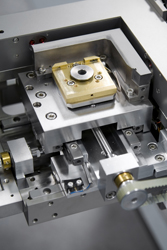Upgrading Western Balkan research in cellular biology
LSCM is used widely in the biological sciences and particularly in cell biology. The Institute for Physiology and Biochemistry (IPB), School of Biology, University of Belgrade with its centre for laser microscopy developed the ‘Reinforcing a centre for laser microscopy and cell profiling for regional networking’ (Neuroimage) project to improve the capacity of its research centre and that of the West Balkans (WBs) in general. Strengthening both facilities and personnel in the Balkans involved in neuroanatomy and neurophysiology research is an important step in integrating the WBs into the European Research Area (ERA) centres and the European neuroscience arena. As such, EU funding for the project was used to upgrade the basic confocal microscopy facility with an advanced laser and high magnification objectives. In addition, to complement the microscopy capacity, the researchers also designed and implemented an electrophysiology setup and included software for physiology time series measurements. The Neuroimage project researchers at IPB are experts in the field of cellular neurophysiology. Together with colleagues at the WB partner centre Croatian Institute for Brain Research (CIBR) in Zagreb, who offer complementary neuroanatomy expertise, the researchers are now well-positioned to bring significant advances to the field of neuroimaging. The Neuroimage project provided funding for three post-docs and two PhD students for the new PhD programme in neuroscience. In addition, the grant enabled numerous professional development and knowledge-sharing opportunities, including several workshops and a training programme in neuroimaging and complementary techniques. In summary, the Neuroimage project enabled significant technological enhancements to the research centre at IPB related to LSCM and professional development for a number of young WB researchers in the field of cell biology. Tangible scientific results are no doubt around the corner.



